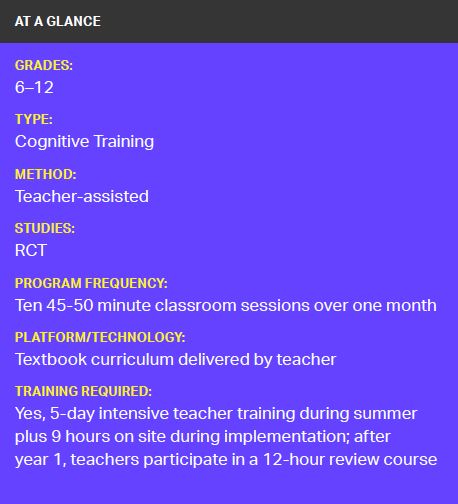 SMART (Strategic Memory Advanced Reasoning Training) is a program developed by researchers from the Adolescent Reasoning Initiative, a division of the Center for Brain Health, University of Texas at Dallas. The program is based on the premise that by improving complex reasoning and innovative thinking, students will expand their cognitive capacity during middle school years and on into college. This adolescent stage of development represents a period associated with rapid growth and reorganization of the brain’s frontal networks, which support advanced EF development. The program trains teachers to implement a set of content-focused cognitive strategies that empower students to take control of their higher-order learning performance. The higher-order EF strategies taught by SMART elevate student confidence, increase their learning ability, and improve academic and life outcomes.
SMART (Strategic Memory Advanced Reasoning Training) is a program developed by researchers from the Adolescent Reasoning Initiative, a division of the Center for Brain Health, University of Texas at Dallas. The program is based on the premise that by improving complex reasoning and innovative thinking, students will expand their cognitive capacity during middle school years and on into college. This adolescent stage of development represents a period associated with rapid growth and reorganization of the brain’s frontal networks, which support advanced EF development. The program trains teachers to implement a set of content-focused cognitive strategies that empower students to take control of their higher-order learning performance. The higher-order EF strategies taught by SMART elevate student confidence, increase their learning ability, and improve academic and life outcomes.
Teachers are provided tactical strategies to engage students in active classroom learning by integrating specific EF bottom-up processes into top-down approaches that improve depth of processing. For example, SMART teaches students how to utilize:
Through pen and paper assignments and group activities, SMART trains students in how to use EF skills to attend to the most important and relevant information, and to identify connections between critical content before the processing of details. This 7-step process includes: deliberate inhibition of extraneous information; chunking and organizing relevant information; inference; paraphrasing; synthesis of important details; interpretation of take-home messages; abstraction of deeper meaning; and synthesis of all the processes to apply top-down thinking (“Improve gist reasoning to help 8th-graders close achievement gap,” 2019). This protocol develops gist reasoning, which is the ability to make connections between pieces of information and generalize meaning from what one is learning to other situations.
SMART’s pre- and post-assessments measure gist reasoning and changes in cognition using the Scale of Advanced Reasoning© (SOAR). SMART has been shown to increase speed and durability of learning, generalize concepts to new content areas, aid the creation of new ideas, build frontal networks function, and improve psychological well-being. The EF integrative cognitive strategies of SMART teach students how to think and reason on deeper levels versus just memorizing facts for short-term retention. The program provides evidence that deploying such strategies elevates learning capacity and can improve standardized test passing rates and scores in all content areas by up to 50 percent.
Educators interested in implementing the SMART program are required to complete intensive training. SMART training includes a summertime, 5-day teacher training as well as a 1-day Leadership Workshop for principals. An additional 9-hour training is required during implementation, and a 12-hour training follows the first year of implementation.
Schools can start a SMART Club, an optional after-school enrichment program. The Adolescent Reasoning Initiative team provides resources for teachers to tailor SMART Club activities to their students.
OVERVIEW: https://brainhealth.utdallas.edu/programs/adolescent-reasoning-initiative/
WEBINAR/VIDEO/DEMO: N/A
CONTACT: bhSmartEd@utdallas.edu, (972) 883-3247
KEY STUDIES SUMMARY:
Fifty-four students (30 girls and 24 boys) in three sections of an eighth grade Advancement via Individual Determination (AVID) class in an inner-city urban Texas public middle school participated in the program. Students demonstrated improvements in gist reasoning—the ability to abstract meaning from complex information. (Gamino, J., Chapman, S., Hull, E., & Lyon, G. (2010). Effects of higher-order cognitive strategy training on gist-reasoning and fact-learning in adolescents. Frontiers in Psychology, 1. doi: 10.3389/fpsyg.2010.00188. https://www.ncbi.nlm.nih.gov/pmc/articles/PMC3153797/)
Another study of 913 7th and 8th graders showed similar improvements in gist reasoning. (Gamino, J., Motes, M., Riddle, R., Lyon, G., Spence, J., & Chapman, S. (2014). Enhancing inferential abilities in adolescence: new hope for students in poverty. Frontiers in Human Neuroscience, 8. doi: 10.3389/ fnhum.2014.00924. https://www.frontiersin.org/articles/10.3389/fnhum.2014.00924/full)
OTHER RESEARCH AVAILABLE:
Motes, M., Gamino, J., Chapman, S., Rao, N., Maguire, M., Brier, M., Kraut, M., & Hart, J., Jr. (2014). Inhibitory control gains from higher-order cognitive strategy training. Brain and Cognition, 84, 44-62. doi: 10.1016/j.bandc.2013.10.007 https://www.ncbi.nlm.nih.gov/pubmed/24286804
Dr. Sandra Bond Chapman, Founder and Chief Director at the Center for BrainHealth, is a BrainFutures Advisory Board member.